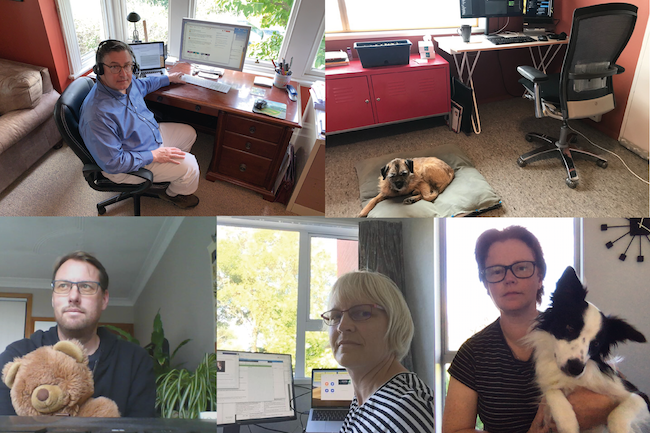
Some Otago Biochemistry research group leaders working hard in their new work spaces. Clockwise from top left: Professor Kurt Krause at his desk, Associate Professor Peter Mace's co-worker and desk (Peter is presumably behind the camera), Associate Professor Stephanie Hughes with her co-worker, Associate Professor Liz Ledgerwood, and Associate Professor Paul Gardner with his co-worker.
Now that the country is in lockdown, and laboratories across university campuses nationwide have closed, you might think that the scientists who usually fill those labs would have put their feet up at home and enjoyed the sunshine for a while. Well, you would be wrong – science doesn't stop just because there are no lab benches or field trips available. Our Biochemistry researchers are still hard at work (admittedly, some might still sit in the sun when they can).
Although 'wet work' carried out in labs usually makes up a good proportion of the science that happens in the Otago Biochemistry Department, a lot of crucial science can only happen when the scientists sit down (or stand up) at a desk.
Our lab group leaders have been in touch with some of the things they and their teams have been working on in the past couple of weeks.
Writing up the results of experiments for publication or to put in theses (student scientists are an important part of our research teams) is a common task right now, as is writing funding applications to support future experiments.
Our researchers have also been busy reading about what other scientists have been doing in their research areas, writing reviews of the literature, and planning new experiments to carry out when they eventually get back to their beloved lab benches and pipettes.
The academic scientists who lead their own lab groups need to keep on top of what everyone else in their group are doing, and most of them teach undergraduate students as well, so are getting to grips with keeping in touch remotely, and teaching and assessing entirely online.
A couple of our research groups with the capability of synthesising enzymes are looking at how they could use these skills to help with the local coronavirus testing effort, if case testing kit reagents become difficult to import.
And of course there are the research groups that carry out their experiments, data collection, and building of new tools almost entirely by computer anyway – these are our bioinformatics scientists. Barring IT issues, they are just continuing their everyday research. In fact, all of our research labs have some component of their research based in bioinformatics, so this is an excellent opportunity to work on that and also to upskill and learn how to use new computational research tools using online courses.
As you can see, plenty to keep busy with in the world of biochemical sciences!